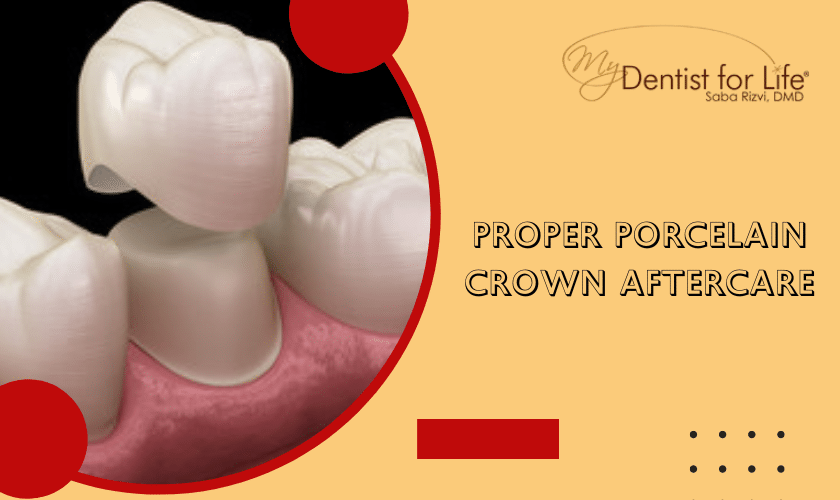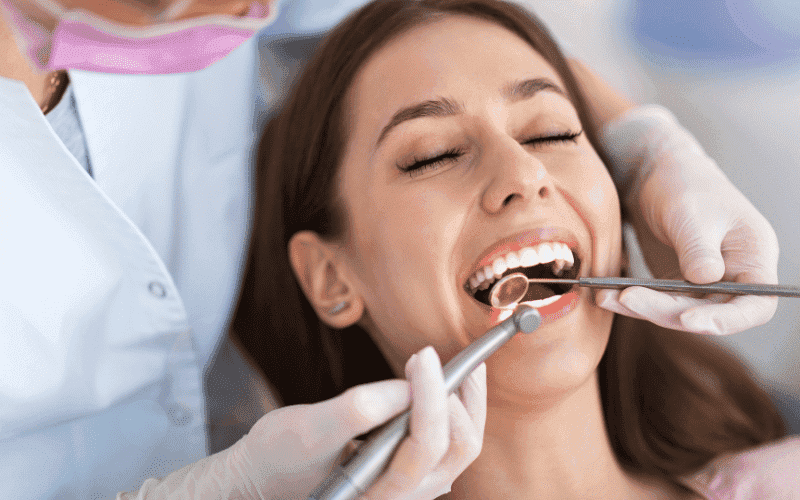ONLINE SCHEDULING AND VIRTUAL CONSULTS AVAILABLE

Essential Tips For Proper Porcelain Crown Aftercare

Are you considering getting porcelain crowns to improve your smile? While these dental restorations are known for their durability and natural-looking appearance, proper Porcelain Crown aftercare is crucial in maintaining them. Neglecting the necessary steps could lead to damage or even replacement of the crown, which can be costly and time-consuming. In this blog post, we’ll share five essential tips that will help you take care of your porcelain crowns so they last longer and continue to enhance your beautiful smile!
What Is Porcelain Crown Aftercare?
When it comes to dental restorations, porcelain crowns are a popular choice for their durability and natural-looking appearance. But like any dental procedure, proper aftercare is crucial to maintaining the longevity of your crown.
Porcelain crown aftercare involves taking certain steps to ensure that your crown remains clean and healthy. One important step is regular brushing and flossing around the area of the crown to prevent plaque buildup. It’s also essential to avoid hard or sticky foods that could potentially damage or dislodge the crown.
In addition, visiting your dentist regularly for checkups can help identify any issues with your porcelain crown before they become more serious problems. Your dentist may also recommend special cleaning techniques or products tailored specifically for porcelain crowns.
Taking care of your porcelain crown requires consistent attention and effort on both your part as well as professional guidance from your dentist. By following these simple tips, you can help ensure that your porcelain crown stays functional and looks great for years to come!
When To Seek Professional Assistance?
After getting a porcelain crown, it’s important to take proper care of it. However, sometimes even with the best aftercare practices, issues can arise that require professional assistance.
One sign that you may need professional help is if your crown becomes loose or falls out completely. This could be due to improper fitting or damage to the tooth underneath. If this happens, don’t try to fix it yourself – schedule an appointment with your dentist as soon as possible.
Another reason to seek professional assistance is if you experience any pain or sensitivity in the crowned tooth. This could indicate nerve damage or infection and requires immediate attention from your dentist.
If you notice any chips or cracks in your porcelain crown, it’s also essential to see a dental professional promptly. These issues can compromise the integrity of the crown and lead to further damage if left untreated.
If you have concerns about the appearance of your porcelain crown such as discoloration or misalignment, speak with your dentist about potential solutions.
Remember that seeking prompt professional assistance can prevent further complications and ensure long-lasting oral health.
How To Clean And Sanitize Your Crown
Keeping your porcelain crown clean and sanitized is an important aspect of proper aftercare. A healthy mouth means a healthy body, so it’s essential to take care of your dental work as you would any other part of your body.
To clean your crown, gently brush it with a soft-bristled toothbrush and non-abrasive toothpaste. Avoid using abrasive toothpaste or hard-bristled brushes as they may scratch the surface of the crown. Additionally, try not to use whitening products on your crown as these can also damage the surface.
Flossing around the base of the crown is also important to remove any buildup or debris that may be trapped between teeth. Use a floss threader if necessary to get underneath the crown for effective cleaning.
Sanitizing your crown can be done by rinsing it with antimicrobial mouthwash or using a water pick to flush out any bacteria that may have accumulated around it. It’s best to consult with your dentist about what type of mouthwash or sanitizing solution is appropriate for you and how often you should use it.
Remember that regular dental check-ups are crucial for maintaining good oral health and ensuring that your porcelain crowns are still in good condition. Your dentist will inspect them during routine visits and recommend if a replacement becomes necessary due to wear and tear over time.
By taking proper care of your porcelain crowns through regular cleaning and sanitizing, you’ll ensure their longevity while keeping yourself healthy at the same time!
How Often To Replace The Crown
Porcelain crowns are known for their durability and longevity. However, like any other dental restoration, they will eventually need to be replaced at some point in time.
The lifespan of a porcelain crown can vary depending on several factors such as oral hygiene practices, diet, and lifestyle habits. Generally speaking, a well-maintained porcelain crown can last up to 15 years or longer before needing replacement.
It’s essential to keep an eye out for signs that your porcelain crown may need replacing. If you experience any discomfort when biting down on food or notice chips or cracks in the crown surface, it could indicate that the restoration is failing.
Other indicators include changes in the color or shape of the surrounding gum tissue around the crowned tooth. These symptoms suggest there may be decay present underneath the crown which requires immediate attention from your dentist.
While porcelain crowns are built to last long term with proper care and maintenance, it’s crucial to monitor them regularly for signs of wear and tear. Remember always to seek assistance from your dental professional if you have concerns about how often you should replace your porcelain crown.
Proper porcelain crown aftercare is essential to maintain the appearance and functionality of your dental crowns. With regular cleaning, maintenance, and professional checkups, you can extend the life of your crown and prevent any potential issues from arising.
By taking care of your crowns, you will ensure that they continue to protect and enhance your smile for years to come.
If you have any questions or concerns about porcelain crown aftercare or need assistance with maintaining your crowns, contact your dentist today.




